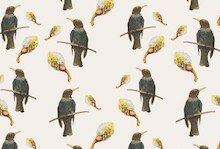Combining East and West
Touching the world of ordinary people who live here or there, and who attempt to find a purpose to their existence in the minor happenings of daily life, provides the substance of Ronny Someck’s poetry, making him a kind of Israeli Billy Collins. Someck succeeds in bridging east and west as well as ordinary experience and the celebration that is poetry and art.
Born in 1951, Ronny Someck was uprooted from his native Iraq when he was four. Transplanted to Israel, Someck spent his childhood in a transit camp for new immigrants. There he was surrounded by music of the great singers Umm Kulthum, Farid al Atrash, and Fairuz shouldering up against Elvis Presley and Billie Holiday. Following these early experiences, Someck has become one of the leading Israeli poets; his work is rich in slang and distinguished by staccato rhythms, quick cuts, close-ups and disturbing segues. No wonder he is so beloved in Israel. In what other poet do we find Tarzan, Marilyn Monroe, and cowboys battling with Rabbi Yehuda Halevi for the hearts and souls of Israelis?
You are probably wondering how I learned about Ronny Someck. Believe it or not, I discovered him on the internet. As the editor of phati’tude Literary Magazine, I took on an ambitious project, that is, to create an edition entitled ‘Awakenings: Bridging the Cultural Divide’, which was, in the aftermath of September 11, my attempt to present the works of Arab, Israeli, Jewish- and Arab-American poets and writers together.
In doing so, I needed to find out more about Israeli writers, and when I found Someck and contacted him, I was equally delighted by his enthusiasm for the project. Believe it or not, and I do not think he knows this, the idea of phatLiterature, a literary television program that we just shot last night, was inspired by his visit to the United States to promote his new book, The Fires Stays in Red.
Ronny Someck is the author of eight books of poetry. His work has been translated into twenty-two languages, including Arabic, Catalan, French, English and Albanian, and has appeared on the internet, and in anthologies and poetry magazines in the United States, South America and Europe. Some of my favorite poems of Someck’s are from his collection, Bloody Mary, with many pieces reminiscent of film noir, filled with quick cuts of speed, danger and uncertainty. His distinct Sephardi voice invokes the odors of falafel and shwarma, the army with its supporting cast of recruits and commandos, the bustle of southern Tel Aviv with its small garages, shops, cheap restaurants, its gangs and Arab workers. He is also the troubadour of the lovelorn, with poems that are hot, erotic, comic, tragic, agape at the wonders of a tear and a tattoo and a snapshot and a bra and a scarecrow. His statement, “My mother dreams in Arabic, I dream in Hebrew”, reappears throughout his poetry; if not literally, it emerges as lingering over most of the pieces he has written.
I was so excited about Someck’s first American book, The Fire Stays in Red, translated from the Hebrew by Moshe Dor and Barbara Goldberg. When I finally had a chance to review the galleys, it was a critical time in my life, my Dad was going in and out of the hospital, and there in the Emergency Room I read them. At 2:00 am in the Emergency Room’s waiting room I laughed, my eyes watered, I was reminded that while life is hard, there are good things that we should always remember, especially during the bad times. This is what Ronny Someck constantly reminds us, in his poetry, and that when it really boils down to it, his poems are really about us, as human beings, and that ultimately that whatever happens, rich or poor, being alive, the essence of living and enjoying that which surrounds us, is a pretty good thing.
Someck is an artist who pushes the envelope and challenges the vanguard by combining his poetry with music and art. It is worth noting that Someck’s musical collaborations with New York musician Elliott Sharp and their groundbreaking CD, Revenge of the Stuttering Child has been proclaimed, and I quote, as a “collaboration of sounds – sounds as word and sounds as music, a tangled-up feedback loop that continuously builds and mutates. Much more than poetry set to music, each piece draws a bead, aims and fires in a different direction, hitting the familiar, the strange, the wry, the warm, the dark, the furious. As Ronny Someck’s words are fleshed by his own throat, Sharp’s music is manifest in his own varied instrumental voices augmented by the talents of pianist Anthony Coleman, the cello and accordion of the Parkins sisters and percussionist Salifoski. In the prolific, unpredictable world of Elliott Sharp, this project stands apart”. Since 1997, Someck and Elliot have collaborated on two other CDs, including: Poverty Line and A Short History of Vodka.
Yesterday, when I asked Someck how he collaborates with artists to transform his poetry into artwork, he responded that to him poetry is a natural transition, that poetry is visual in the mind and can and should be accessible to the canvas. He has therefore managed to do what most poets only dream of doing: to have successful art shows of his own work or art created with his work in mind at such venues as the Eretz-Israel Museum, The Israel Museum, the Tel-Aviv Museum, Binet Gallery, the Z Gallery in New York, in collaboration with noted artists such as Yigal Ozeri, Amir Cohen and Benni Efrat.
Someck is a modest soul. While he takes his works and his craft very seriously, he manages not to take himself seriously. This is one of the reasons we take him seriously. Certainly, this quality is reflected by the numerous awards and prizes he has earned and Someck has also participated in international poetry events throughout the world.
Someck has published award-winning collections to international acclaim. Yet, he clearly sees himself as an ordinary man who lives day-by-day in an almost impossible political situation, who helps children learn how to write and who writes his own work through a process of observation. Not stories that promote national anthems, not stories that dictate politics, rather, he writes poems about invisible people, the street people, the ordinary people, sometimes people in extraordinary circumstances. Through all of this, Someck manages to maintain a sense of humanity, which is reflected in the body of works he has produced over the past twenty years. This is what makes his poetry special. This is what makes Someck special, that his work can touch my life, that of an African American woman half-way around the world.
Excerpted from a talk on Ronny Someck and his work in New York, September 29, 2002.








